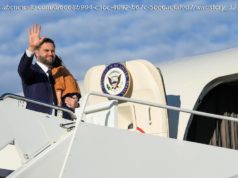The Trump administration delivered a gut punch to America’s closest allies on Thursday, imposing tariffs on steel and aluminium from Europe, Mexico and Canada in a move that drew immedi
The Trump administration delivered a gut punch to America’s closest allies on Thursday, imposing tariffs on steel and aluminium from Europe, Mexico and Canada in a move that drew immediate vows of retaliation.
Stock prices slumped amid fears of a trade war, with the Dow Jones industrial average falling nearly 252 points, or 1%, to 24,415.84.
The import duties threaten to drive up prices for American consumers and companies and are likely to heighten uncertainty for businesses and investors around the globe.
Commerce Secretary Wilbur Ross said the tariffs — 25% on imported steel, 10% on aluminium — would take effect on Friday.
President Donald Trump had originally imposed the tariffs in March, saying a reliance on imported metals threatened national security. But he exempted Canada, Mexico and the European Union to buy time for negotiations — a reprieve that expired at midnight on Thursday.
Other countries, including Japan, America’s closest ally in Asia, are already paying the tariffs.
The administration’s actions drew fire from Europe, Canada and Mexico and promises to quickly retaliate against US exports.
“This is protectionism, pure and simple,” said Jean-Claude Juncker, president of the European Commission.
French president Emmanuel Macron called the US decision to levy tariffs on the European Union “illegal” and a “mistake”.
He ominously recalled the pre-Second World War period saying, “Economic nationalism leads to war. This is exactly what happened in the 1930s.”
The EU earlier threatened to counterpunch by targeting US products, including Kentucky bourbon, blue jeans and motorcycles.
David O’Sullivan, the EU’s ambassador in Washington, said the retaliation will probably be announced in late June.
Mexico complained that the tariffs will “distort international trade” and said it will penalize US imports including pork, apples, grapes, cheeses and flat steel.
In Canada, Prime Minister Justin Trudeau said: “These tariffs are totally unacceptable.”
Canada announced plans to slap tariffs on 12.8 billion dollars-worth (£9.65 billion) of US products, ranging from steel to yogurt and toilet paper.
“Canada is a secure supplier of aluminium and steel to the US defence industry, putting aluminium in American planes and steel in American tanks,” Mr Trudeau said.
“That Canada could be considered a national security threat to the United States is inconceivable.”
Mr Trump had campaigned for president on a promise to crack down on trading partners that he said exploited poorly negotiated trade agreements to run up big trade surpluses with the US.
The US tariffs coincide with — and could complicate — the Trump administration’s separate fight over Beijing’s strong-arm tactics to overtake US technological supremacy.
Mr Ross is leaving on Friday for Beijing for talks aimed at preventing a trade war with China.
The world’s two biggest economies have threatened to impose tariffs on up to 200 billion dollars-worth (£150 billion) of each other’s products.
The steel and aluminum tariffs could also complicate the administration’s efforts to renegotiate the North American Free Trade Agreement (Nafta) with Canada and Mexico, a pact that Mr Trump has condemned as a job-killing “disaster”.
The White House released a statement from Mr Trump on Thursday night saying of Nafta, “Earlier today, this message was conveyed to Prime Minister Justin Trudeau of Canada: The United State (sic) will agree to a fair deal, or there will be no deal at all.”
Mr Trump had offered the two US neighbours a permanent exemption from the steel and aluminium tariffs if they agreed to US demands on Nafta. But the Nafta talks stalled.
Mr Ross said there was “no longer a very precise date when they may be concluded”, and that as a result, Canada and Mexico were added to the list of countries hit with tariffs.
Likewise, the Trump trade team sought to use the tariff threat to pressure Europe into reducing barriers to US products. But the two sides could not reach an agreement.
The import duties will give a boost to American makers of steel and aluminum by making foreign metals more expensive. But companies in the US that use imported steel will face higher costs.
And the tariffs will allow domestic steel and aluminum producers to raise prices, squeezing companies — from car makers to can producers — that buy those metals.






